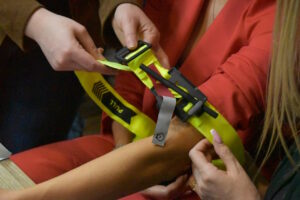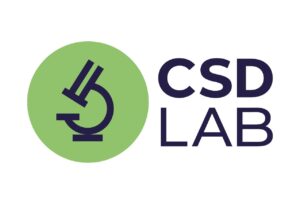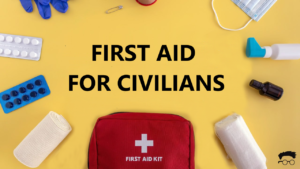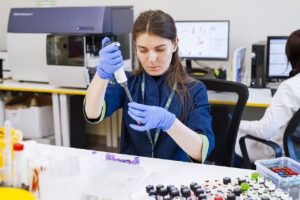
On Saturday, March 2, Kyiv will host a training seminar “First Aid for Injuries and Traumas” specially designed for journalists and bloggers. The event is organized by the Experts Club Kyiv Analytical Center with the support of its medical partner, ADONIS Medical Center Group, and its general partner, Pryirpinia Community Foundation.
The training aims to teach participants the basics of first aid in case of injuries and traumas, which is an important knowledge for everyone in times of war.
The seminar will be conducted by an anesthesiologist and co-author of 12 scientific publications, Mariana Bolyuk, who is a representative of the ADONIS Medical Center Group.
ADONIS, EXPERTS_CLUB, FIRST_AID, MEDICAL_AID, MEDICINE, URAKIN, БОЛЮК

Doctors note an increase in the number of preventive examinations and referrals related to advanced forms of diseases.
“We are now seeing an increase in the number of preventive examinations in various areas. At the same time, we have a situation with surgical interventions for more advanced forms of problems,” Vadym Zukin, chief operating officer of the Leleka multidisciplinary medical center, told Interfax-Ukraine.
He emphasized that “in 2022, many Ukrainians cared less about their health for obvious reasons.”

“We are already feeling the negative impact of the war on public health. This applies even to those who were not directly affected by the war,” said the director of the medical center.
Zukin also noted that the clinic has seen an increase in demand for pregnancy management services.
“We predict that compared to the first half of 2023, the number of births in Kyiv will gradually increase over the next six months and in early 2024, but these figures will be quite far from the pre-war levels,” he said.
At the same time, according to Zukin, Ukraine currently has a “very strange situation with vaccination,” in particular due to a shortage of vaccines.
“Everyone recognizes that it is useful, patients are willing to pay for it themselves, but there is a significant shortage of many vaccines in Ukraine,” he said.
Commenting on the prospects for regional development, particularly in the de-occupied regions, Zukin noted that he currently sees no opportunities for regional development.
“Opening regional branches of the medical center requires significant investments. Moreover, our institution is 99% funded by patients’ donations. At the same time, we need to understand that quality medicine is quite expensive. Therefore, despite our great desire to help the population of the de-occupied territories, it is too early to talk about opening branches there,” he said.
At the same time, Zukin believes that “under the current conditions, it is impossible to launch medical institutions as serious market players in those areas.”
Commenting on the effectiveness of private clinics’ participation in the national healthcare system, Zukin noted that “private medicine can be very useful for the general healthcare system due to its high management efficiency and flexibility.”
In turn, Vadym Shekman, CEO of Dobrobut Medical Network, said that one of the recent trends is that “medicine, which used to develop more actively in Kyiv, is now developing in Ukrainian regions, because there is a demand for quality medicine everywhere.”
“We are looking at this carefully not only from the perspective of potential acquisition of interesting institutions, but also from the perspective of possible partnership with regional clinics for which we can be a center of expertise. In fact, our goal and dream is to build a medical network of such a scale that high-quality medical care will be available to Ukrainians wherever they are,” he said.
Mr. Shekman noted that Dobrobut Medical Network “has always seen itself as a national player.”

“The plans to enter other cities with medical centers remain in force. The war has made adjustments to these plans, they have shifted slightly in time. We will realize these intentions after our victory,” he said.
At the same time, commenting on the possible prospects of opening clinics in the de-occupied regions, Shekman noted that “private medicine implies that a person has to pay for medical services out of his or her own pocket, and accordingly, the appropriate economic situation should be created in the de-occupied cities.”
“We would be happy to open in the liberated Ukrainian territories as soon as the opportunity arises,” he said.
In general, Shekman believes that “it is impossible to create a high-quality medical system without involving business.”
“Our state simply will not have enough money in the budget to rebuild and create the healthcare system we need. Healthcare in the world is becoming more expensive every day, and we must be ready to meet these challenges. Today, private healthcare is developing in Ukraine because there is a demand for quality healthcare and services. It cannot be said that many private healthcare facilities are now working with the NHSU, as the packages it offers do not include all costs and are lower than the cost of private clinics,” he said.
Mr. Shekman emphasized the importance of the fact that “the state has started to move towards private business.”
“To attract foreign investment, we need to create a system that is attractive to investors, so that they understand not only what to invest in, but also how they can get their money back. And this does not mean that healthcare will be exclusively paid for – in the context of competition, the cost of services usually decreases. And today, let’s be honest, there is no free medicine in Ukraine,” he said.

For his part, Serhiy Katsan, deputy director of the Filatov Institute of Eye Diseases and Tissue Therapy of the National Academy of Medical Sciences of Ukraine (Odesa) for Scientific and Medical Work, noted that recent trends include the consequences of an increase in the number of patients admitted to the clinic “with advanced stages of eye diseases, with complications, which further leads to longer treatment periods, inability to overcome the disease with therapeutic methods, and the need for surgical treatment…”.
“First of all, this concerns patients with inflammatory diseases of the eye and ophthalmic oncology. The number of patients in the department of microsurgical treatment of children’s eye diseases has also increased,” he said.
FILATOV INSTITUTE, MEDICAL EXAMINATION, MEDICINE, SERGIY_KATSAN, Лелека

It has long been known that the body’s response to various drugs, and thus the effectiveness of treatment, depends on the metabolic characteristics of each individual. But the study of genetic factors that affect chemical transformations in the body began only in the 20th century.
The paradigm of “treating the patient, not the disease” resulted in the concept of “personalized medicine”. The essence of personalized medicine is the individualization of drug therapy. The response to a drug, the optimal class of drug, its dose and mode of administration are determined, at least in part, by genetic determinants. Pharmacogenetics seeks to identify genes and their variants that determine the adequacy of pharmacotherapy and reduce the risk of side effects.
For a modern doctor, pharmacogenetics is a convenient and affordable tool to increase the effectiveness of evidence-based therapy for many diseases and, at the same time, reduce the likelihood of side effects. For a patient, pharmacogenetics means confidence that the drug prescribed by a doctor will act reliably and predictably, and will show maximum therapeutic effectiveness.
What needs to be done for this? Investigate the genetic information of a particular person regarding the genes that affect drug transport.
CSD LAB has long established itself as a progressive and innovative laboratory that implements modern diagnostic methods that should be useful to doctors for prescribing effective therapy. This spring, we created the Development and Innovation Department, which aims to develop diagnostic capabilities and medical science for their further implementation in the everyday life of the Ukrainian medical community.
From now on, the first pharmacogenetics services have been introduced in the list of CSD LAB laboratory diagnostics.
What pharmacogenetics tools are available in Ukraine today?
Currently, CSD LAB offers two tests that will allow individualizing the treatment of many diseases.
1. CYP2C9 (analysis of polymorphism of alleles *2, *3) and VKORC1 (analysis of G1639A polymorphism), determination of warfarin sensitivity, PCR, blood \ N
https://www.csdlab.ua/analyzes/farmakohenetka/cyp2c19-analiz-polimorfizmu-aleley-2-3-ta-vkorc1-analiz-polimorfizmu-g1639a
The test determines sensitivity to warfarin by detecting CYP2C9*2, CYP2C9*3 and VKORC1 G1639A mutations in human genomic DNA by real-time PCR.
The most common complication of warfarin therapy is bleeding, the risk of which can be reduced by 35%, and taking into account other factors (patient weight, prescription of other medications, etc.) – by 50%.
Warfarin is used for the treatment and prevention of deep vein thrombosis and pulmonary embolism, for the secondary prevention of myocardial infarction and prevention of thromboembolic complications (stroke or systemic embolism) after myocardial infarction, for the prevention of thromboembolic complications in patients with atrial fibrillation, heart disease or prosthetic heart valves, prevention of dynamic cerebrovascular disorders and stroke, and prevention of postoperative thrombosis.
2. CYP2C19 (analysis of allele polymorphism *2, *3, *17) PCR, blood \ N
https://www.csdlab.ua/analyzes/farmakohenetka/cyp2c19-analiz-polimorfizmu-aleley-2-3-17-plr-krov-n
This genetic test will allow you to determine the variations of the CYP2C19 gene (CYP2C19*2, CYP2C19*3 CYP2C19*17).
CYP2C19 is a clinically important enzyme involved in the biotransformation of a number of antidepressants, anticoagulants, and antimycotic drugs. For example, clopidogrel is a very effective antiplatelet drug whose action is based on irreversible inhibition of the platelet receptor P2RY12. However, in some patients, the therapeutic effect of the drug does not manifest itself, which is why it is necessary to change the drug, losing time in the patient’s treatment.
Why does this happen? The answer is simple: clopidogrel is a prodrug, which is activated by the cytochrome P450 complex, mainly CYP2C19. With a certain gene variant, this does not happen and the effectiveness of the drug is significantly reduced. In this case, you should choose another antiplatelet drug.
How to work with this?
The main goal of pharmacogenetics is to use the patient’s individual genetic information to inform and prescribe the most effective type and dose of drugs. Currently, targeted diagnostics and treatment of a patient can be determined according to the results of a study of his or her genetic profile, which makes pharmacotherapy for patients as effective, safe and affordable as possible.
However, personalized medicine is a relatively new area of medicine in general, and the new approach is to test patients for possible reactions to new drugs and to develop a treatment based on the test results.
In order to help Ukrainian doctors better understand pharmacogenetics, CSD LAB plans to hold a course of lectures on pharmacogenetics this fall.

In another video on the YouTube channel of the Kiev analytical center “Club of Experts”, the anesthesiologist of the medical group Adonis, Mariana Bolyuk, spoke about the main types of medical assistance in Ukraine, and also analyzed the specifics of the first pre-medical aid, including the algorithms of basic life support.
“Medical assistance in Ukraine at the moment, according to current legislation, is divided into emergency, primary, secondary (specialized), tertiary (highly specialized), palliative, medical rehabilitation,” Mariana Bolyuk pointed out.
The doctor emphasized that first aid is the implementation of basic medical measures to save lives, reduce human suffering in an emergency, and prevent possible complications.
“We, medical professionals, provide this assistance professionally, but it is important to remember that the ambulance may not always arrive on time at the scene. Therefore, knowing how to provide first aid to the victim before the arrival of the rescue services may be crucial to save his life,” Bolyuk emphasized.
She also spoke about the algorithm of basic actions that should be adhered to when providing first aid:
In turn, the founder of the Club of Experts, Maxim Urakin, emphasized that according to the UN, the total number of dead and injured as a result of war among the civilian population has already reached 25,671 people, of which 9,287 people died.
“It should be noted that the real number of victims may be significantly higher, as many cases of death or injury have not yet been confirmed, and information from some areas where hostilities continue comes with a delay,” Maxim Urakin stressed.
In the expert’s opinion, journalists and media workers are among the main risk groups, as their professional activity is associated with the possibility of getting into an emergency.
“For this reason, in June, the ‘Club of Experts’ introduced an initiative to train media representatives in the basics of providing primary medical aid. And the first seminar-practical training has already taken place,” Urakin concluded.
Watch more in detail in the video on the YouTube channel “Club of Experts”:
You can subscribe to the Club of Experts channel here: https://www.youtube.com/@ExpertsClub
CLUB_EXPERTS, FIRST_AID, MEDICAL_AID, MEDICINE, URAKIN, АДОНИС, БОЛЮК

“In August 2022, we entered the premises of the first building of our all-Ukrainian clinic for the first time. In October, renovation work began here and in April, after a record 5 months, we opened the doors of the first building of the Superhumans Center,” the statement reads.
“Superhumans is not just a clinic, not just a network of clinics, it’s a philosophy and rightly so. The rebuilding of a country begins with the rebuilding of each individual, military or civilian. Child or adult. And when we see the creation of such a center, we see the creation of a place of strength,” said First Lady Elena Zelenskaya, the center’s ambassador, at the opening.
“For me, it’s a personal obligation, my way of giving thanks to those we win. The military and civilians who paid for our country’s freedom with their own health will receive at Superhumans the most advanced technology, the best medical expertise from around the world, an individualized itinerary – everything they need to get back to active life,” said Superhumans co-founder Andrew Stavnitzer.
“We are honored to be part of this extraordinary effort to help world-class Ukrainians who have been terribly injured in this war – they are truly ‘Superhumans.’ Russia’s full-scale invasion of Ukraine is a war against civilians.
Many men, women, and children will lose life or limb, even long after the war is over, due to the sheer number of mines in large parts of Ukraine. This center is a step toward giving Ukrainians a chance to rebuild their lives and their country,” said Howard G. Buffett, chairman and CEO of the Howard G. Buffett Foundation.
The Superhumans Center is a comprehensive medical facility that will prosthetically treat and rehabilitate patients, primarily those who have been injured as a result of Russian aggression.
The first phase of the center, a prosthetic workshop and part of the rehabilitation center, were opened April 14. According to Vladimir Golovatsky, deputy medical center, more than sixty medical specialists will work in the center. Annually about 3 thousand patients will be treated there.
Investment in the launch of the Superhumans rehabilitation medical center in Lviv is estimated at $54 million, Superhumans CEO Olga Rudneva said earlier.
The first stage of the project includes repairs of premises, purchase of equipment, a year of medical team salaries and purchase of materials for prosthetics.
The second and third phases include the launch of all the buildings of the hospital, the start of the educational center on the basis of Superhumans, and expansion to other regions of Ukraine, in particular, to Kharkiv.
The project has already been supported by the Howard Buffett Foundation, the Richard Branson Virgin Unite Foundation, Cargill, Payoneer, Freedom Finance, Loro Piano, Mastercard, SD Capital and others.
A memorandum of cooperation was signed between Superhumans and the Ministry of Health. Health Minister Viktor Lyashko noted that the joint goal is to provide Ukrainians who suffered war injuries with the world’s best expertise.
Ottobock, a German manufacturer of technologies for manufacturing various types of prostheses, orthoses and exoskeletons, is working with the Superhumans project to launch a laboratory for the production of prostheses. Ossur, a leading manufacturer of bionic and other prostheses from Iceland, is also advising the team on starting its own production of prostheses.
The project is being created at the initiative of Ukrainian businessman Andrei Stavnitser. Another of its founders is Philip Grushko.

CSD LAB medical laboratory is opening partner laboratory offices in the front-line regions of Ukraine.
The company told Interfax-Ukraine news agency that, in particular, CSD LAB is opening laboratories on their basis together with medical centers.
“We opened partner laboratory offices in the frontline regions of Slavyansk, Kramatorsk and Konstantinovka (Donetsk region),” the company specified.
CSD LAB reported that the company opened more than 15 lab offices together with partners during the war, including three in Ternopil, offices in Dnipro, Khmelnytsky, Drohobych, Kamyanets-Podilsky, Ivano-Frankivsk, Lutsk, Chernivtsi, Chernomorsk, Slavyansk, Kramatorsk and Konstantinivka.
Currently there are over 70 laboratory offices and biomaterial collection points in the network all over Ukraine.
CSD LAB – one of the leading laboratories in Ukraine, provides more than 1500 tests – from general blood analysis to determination of genetic disorders in the tumor by NGS method. For 12 years CSD LAB has been one of the largest pathomorphological laboratories in Eastern Europe.
CSD LAB unites six laboratories: pathomorphology, cytomorphology, oncohematology, microbiology, clinical diagnostic laboratory and molecular genetics center. Every year it conducts more than 1.5 million tests.
Production facilities and modern high-tech equipment are located in Kiev and Lviv on a total area of more than 5 thousand square meters, as well as in Moldova and Georgia.